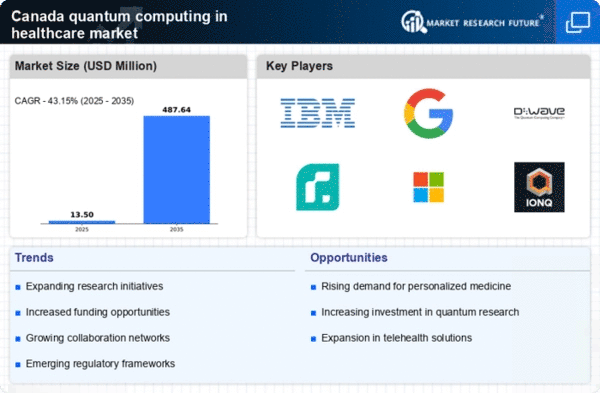Government Support and Funding Initiatives
Government support for the quantum computing-in-healthcare market in Canada is becoming increasingly pronounced. Various funding initiatives and grants are being introduced to foster research and development in quantum technologies. The Canadian government has allocated over $1 billion to support quantum research, which includes healthcare applications. This financial backing is expected to stimulate innovation and attract private sector investment. Furthermore, partnerships between government agencies and research institutions are likely to enhance the development of quantum computing solutions tailored for healthcare. As a result, the market is poised for growth, with government involvement serving as a catalyst for advancements in healthcare technologies.
Growing Focus on Data Security and Privacy
As the quantum computing-in-healthcare market evolves, the emphasis on data security and privacy is becoming increasingly critical. With the rise of digital health records and telemedicine, safeguarding patient information is paramount. Quantum computing offers advanced encryption methods that could potentially revolutionize data security in healthcare. In Canada, regulatory bodies are tightening data protection laws, which necessitates the adoption of robust security measures. The market is likely to see a shift towards quantum encryption technologies, which may enhance trust among patients and healthcare providers. This focus on security could drive further investment in quantum solutions, as organizations seek to comply with regulations and protect sensitive information.
Advancements in Drug Discovery and Development
The quantum computing-in-healthcare market is poised to benefit significantly from advancements in drug discovery and development. Traditional methods of drug discovery are often time-consuming and costly, but quantum computing has the potential to streamline these processes. In Canada, pharmaceutical companies are increasingly exploring quantum technologies to simulate molecular interactions and predict drug efficacy. This could reduce the time required for clinical trials and lower development costs. The market for drug discovery is expected to reach $50 billion by 2027, and the integration of quantum computing may accelerate this growth. As a result, the healthcare sector could witness a paradigm shift in how new therapies are developed and brought to market.
Rising Demand for Advanced Healthcare Solutions
The quantum computing-in-healthcare market is experiencing a notable surge in demand for advanced healthcare solutions. This demand is driven by the need for more efficient diagnostic tools and treatment options. In Canada, healthcare providers are increasingly seeking innovative technologies that can enhance patient outcomes. Quantum computing offers the potential to process vast amounts of data rapidly, enabling healthcare professionals to make informed decisions. The market is projected to grow at a CAGR of approximately 25% over the next five years, reflecting the urgency for cutting-edge solutions. As healthcare systems strive to improve efficiency and reduce costs, the integration of quantum computing technologies is likely to play a pivotal role in transforming patient care and operational workflows.
Integration of Artificial Intelligence and Quantum Computing
The convergence of artificial intelligence (AI) and quantum computing is emerging as a transformative driver for the quantum computing-in-healthcare market. AI algorithms can analyze complex datasets, while quantum computing can process these datasets at unprecedented speeds. In Canada, this integration is expected to enhance predictive analytics, enabling healthcare providers to anticipate patient needs more effectively. The market for AI in healthcare is projected to reach $10 billion by 2026, and the incorporation of quantum computing could further accelerate this growth. This synergy may lead to breakthroughs in drug discovery, personalized medicine, and patient management, ultimately improving healthcare delivery.
















